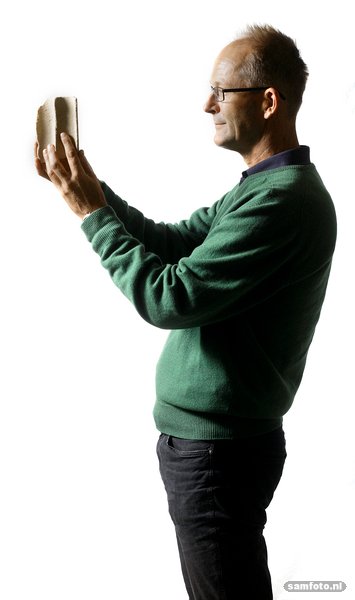View - Timo Heimovaara
Professor of environmental geotechnology Timo Heimovaara (CEG) is studying ways to extract raw materials without producing waste and emissions.
“I’m studying the impact of human activity on the subsurface and how we can reduce it. When I joined TU Delft in 2007, one of the first initiatives was the STW perspective programme BioGeoCivil, in which we studied the use of natural processes as a building material. One of my colleagues, Leon van Paassen, is researching the use of microorganisms to cement sand into sandstone. The subsurface is a living ecosystem that can provide us with many services. My dream is that we will appreciate these services and use them more sustainably so that future generations can also continue to benefit.
At Geoscience and Engineering it is our mission to discover and study underground resources and to support their use in an environmentally friendly way. That’s what it says on the wall. We provide support for the use of the subsoil and the extraction of raw materials. We do this in an environmentally friendly way, which means no waste, no emissions and a minimal impact, while striving for circularity.
At present, the Netherlands still obtains 90% of its energy from fossil fuels. We can’t just stop using them overnight. We need to guide the fossil industry towards waste-free and emission-free extraction methods. Our students demand the same of us. They will have to go implement the energy transition.
The first approach is to say to the business community: we want to do research with you – we are also dependent on external funding – but we want to do this in such a way that we can meet the long-term objective of zero waste, zero emissions and a minimal impact.
This is particularly difficult for mining. Preventing emissions and waste isn’t cheap. As consumers, we must be willing to pay for this, but we don’t want to. Nevertheless, I think that we at TU Delft should have the courage to lead the way, for example, by advising on how to achieve a minimum impact. There are methods where the waste is kept below ground and the ore is dissolved using acid and purified above ground. But this method of extraction will only be feasible if we tax the current mining industry on all the associated effects. You can achieve a lot for the right price. But I’m an optimist.
Sustainable land use also has an impact. There are plans to increase geothermal energy production 100-fold by 2050. That means drilling holes all over the Netherlands, but that makes underground hydrogen storage impossible, even though this could be much more beneficial than having hot water.
As a university, we build on the knowledge we have gained for the oil and gas industry, but we can also use that knowledge and experience for completely different subsurface applications such as gas storage and geothermal energy. We want to harness the potential of the subsurface to benefit society.”
Professor Timo Heimovaara is the Department Chair of Geoscience & Engineering at the faculty of Civil Engineering and Geosciences. His main research interests are focused around the question: How to use natural processes as engineering tools in the subsurface in order to achieve a more sustainable society?
